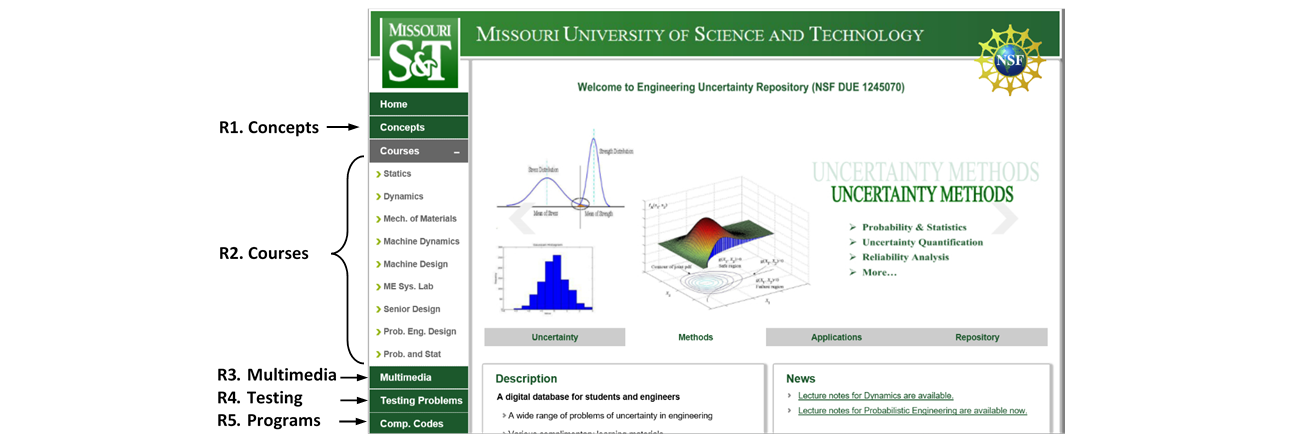Dr. Xiaoping Du
Professor
Mechanical & Aerospace Engineering
- dux@mst.edu
- Phone: (573) 341-7249
- 290D Toomey Hall
Publications:
- Reliability-Based Multidisciplinary Sys Design under Time-Dependent Uncertainty
- Quantitative Reliability Prediction in Early Design Stages
- Reliability Prediction for System Designs with Outsourced Components
- Engineering Uncertainty Repository
Reliability-Based Multidisciplinary Sys Design under Time-Dependent Uncertainty
Reliability-Based Multidisciplinary Systems Design under Time-Dependent Uncertainty

INVESTIGATORS
Xiaoping Du (dux@mst.edu, 573-341-7249)
FUNDING SOURCE
National Science Foundation
PROJECT DESCRIPTION
The objective of this award is to explore optimal ways to design high reliability into multidisciplinary systems under time-dependent uncertainty. Varying randomly over time, time-dependent uncertainty is the major factor that hinders the ability or reliability of a system to perform its intended function over its service period. This research aims to optimally reduce the effect of time-dependent uncertainty on the system reliability. To best address the challenges in multidisciplinary systems design, the developed methodologies will specifically account for complexities such as coupling between subsystems, nonlinearity of system responses, and expensive system simulations. This research will integrate methodologies of both multidisciplinary systems design and advanced time-dependent reliability analysis. The integration will accurately predict the time-to-failure distribution for a given set of design variables, hence allowing for a direct link between design variables and time-dependent system reliability. Then with multidisciplinary design optimization (MDO), optimal system designs can be automatically identified with desired system reliability and reduced cost.
If successful, the results of this research will impact broad areas of engineering design and will be applicable to wide engineering applications, ranging from large defense and civil systems to small integrated circuit systems. Beyond engineering design, potential areas that will benefit include energy, system engineering, operations research, management, and reliability engineering, where time-dependent probabilistic approaches play a vital role. The knowledge from this project will be transferred through seminars, conference presentations, and journal articles. The introduction of the research results into the classroom will also increase awareness of uncertainties and better foster engineering students' probabilistic skills.
PUBLICATIONS
- "Reliability Analysis with Monte Carlo Simulation and Dependent Kriging Predictions," Zhu, Z, Du, X., accepted by ASME Journal of Mechanical Design, 2016.
- "Uncertainty Quantification of Time-Dependent Reliability Analysis in the Presence of Parametric Uncertainty," ASCE-ASME Journal of Risk and Uncertainty in Engineering Systems, Part B. Mechanical Engineering, 2(3), 031001-031001-9, 2016.
- "Reliability-Based Design Optimization under Stationary Stochastic Process Loads," Hu, Z., Du, X., Engineering Optimization, 48(8), 1296-1312, 2016.
- "Time-Dependent Reliability Analysis for Function Generation Mechanisms with Random Joint Clearances," Zhang, J., Du, X., Mechanism and Machine Theory, 92, 184-199, 2015.
- "A Random Field Approach to Reliability Analysis with Random and Interval Variables," Hu, Z., Du, X., ASCE-ASME Journal of Risk and Uncertainty in Engineering Systems, Part B. Mechanical Engineering, 1(4), 041005-1 - 041005-11, 2015.
- "Mixed Efficient Global Optimization for Time-Dependent Reliability Analysis,” Hu, Z., Du, X., ASME Journal of Mechanical Design, 137(5), 051401-1 - 051401-9, 2015.
- "First Order Reliability Method for Time-Variant Problems Using Series Expansions," Hu, Z., Du, X., Structural and Multidisciplinary Optimization, 51(1), 1-21, 2015.
- "Reliability-Based Fatigue Life Investigation for A Medium-Scale Composite Hydrokinetic Turbineblade," Li, H., Hu, A., Chandrashekhara K., Du, X., and Mishra R., Ocean Engineering, 89(1), 230-242, 2014.
- "Robust Design for Multivariate Quality Characteristics Using Extreme Value Distribution," Yang, C., Du, X., ASME Journal of Mechanical Design, 136(10), 101405-1 - 101405-8, 2014.
- “Time-Dependent Mechanism Reliability Analysis With Envelope Functions and First-Order Approximation," Du, X., ASME Journal of Mechanical Design, 136(8), 081010-1 - 081010-7, 2014.
- “Robust Design with Imprecise Random Variables and Its Application in Hydrokinetic Turbine Optimization,” Hu, Z., Du, X., Kolekarb, N.S., and Banerjee, A., Engineering Optimization, 46(3), 393-419, 2014.
- “Fatigue Reliability Analysis for Structures with Known Loading Trend,” Hu, Z., Du, X., Conrad, D., Twohy, R., and Walmsley, M., 50(1), 9-23, Structural and Multidisciplinary Optimization, 2014.
- "Lifetime Cost Optimization with Time-Dependent Reliability," Hu, Z., Du, X., Engineering Optimization, 46(10), 1389-1410, 2014.
- "Probabilistic Inverse Simulation and Its Application in Vehicle Accident Reconstruction," Zhang, X., Hu, Z., and Du, X., ASME Journal of Mechanical Design, 135(12), 121006-1 - 121006-10, 2013.
- “A Sampling Approach to Extreme Values of Stochastic Processes for Reliability Analysis,” Hu, Z. and Du, X., ASME Journal of Mechanical Design, 135(7), 071003-1 – 071003-8, 2013.
- “Time-Dependent Reliability Analysis with Joint Upcrossing Rates,” Hu, Z. and Du, X., Structural and Multidisciplinary Optimization, 48(5), 893-907, 2013.
- “Inverse Simulation under Uncertainty by Optimization,” Du, X., ASME Computing and Information Science in Engineering, 13(2), 021005-1 - 021005-8, 2013.
- “Simulation-Based Time-Dependent Reliability Analysis for Composite Hydrokinetic Turbine Blades,” Hu, Z. and Du, X., Structural and Multidisciplinary Optimization, 47(5), 765-781, 2013.
- “First Order Reliability Method with Truncated Random Variables,” Du, X. and Hu, Z., ASME Journal of Mechanical Design, 134(9), 091005-1 - 091005-9, 2012.
- “Reliability Analysis for Hydrokinetic Turbine Blades,” Hu, Z. and Du, X., Renewable Energy, 48, 251–262, 2012
- “Robust Design Optimization with Bivariate Quality Characteristics,” Du, X., Structural and Multidisciplinary Optimization, 46(2), 187-199, 2012.
- “Reliability-Based Design Optimization with Dependent Interval Variables,” Du, X., International Journal for Numerical Methods in Engineering, 91(2), 218–228, 2012.
- “Towards Time-Dependent Robustness Metrics,” Du, X., ASME Journal of Mechanical Design, 134(1), 011004-1 - 011004-8, 2012.
- “Time-Dependent Probabilistic Synthesis for Function Generator Mechanisms,” Zhang, J., Wang, J., and Du, X., Mechanism and Machine Theory, 46(9), 1236-1250, 2011.
- “Time-Dependent Reliability Analysis for Function Generator Mechanisms,” Zhang, J., Wang, J., and Du, X., ASME Journal of Mechanical Design, 133(3), 031005-1 - 031005-9, 2011.
Quantitative Reliability Prediction in Early Design Stages
Quantitative Reliability Prediction in Early Design Stages

INVESTIGATORS
Xiaoping Du (dux@mst.edu, 573-341-7249)
FUNDING SOURCE
National Science Foundation
PROJECT DESCRIPTION
The objective of this collaborative research project is to predict product reliability in the earliest design stages, such as concept design. The prediction is based on information gathered from a variety of sources such as previous components and products, expert opinions, early prototype testing, and simulations. The project uses a Bayesian framework that aggregates and processes uncertain information. Quantifying product reliability in early design stages helps reduce risk and avoid costly and unnecessary design changes. This project uses a graphical model of probabilities to represent system reliability and a combination of subjective and objective information, using reliability-related data that are scattered, in different formats, at different levels of details, from various sources. Pulling together all this data allows for more accurate reliability prediction, leading to more effective actions identified early to prevent potential failures or reduce their likelihood.
This project will improve design practices for all kinds of products, because reliability is a core element of product performance and directly determines customer satisfaction, product market share, and product safety. Specifically, this project will advance engineering design theory and methodology and expand the scope of reliability engineering. By quantitatively predicting product reliability early, the project provides engineers with a better way to achieve high reliability with reduced cost.
PUBLICATIONS
- "System Reliability Analysis with Dependent Component Failures during Early Design Stage – A Feasibility Study," Cheng, Y., Du, X., 138(5), 051405-1-12, 2016.
- "A Physics-Based Reliability Method for Components Adopted in New Series Systems," Hu, Z., Du., X., 2016 Annual Reliability & Maintainability Symposium, January 25-28, 2016 in Tucson, AZ.
- “Consider Dependent Component Failures during Early Design Stage," Cheng, Y., Du, X., the ASME 2015 International Mechanical Engineering Congress & Exposition, November 13-19, 2015 in Houston, Texas.
- "Enhancing Product Robustness in Reliability-based Design Optimization," Zhuang, X., Pan, R., and Du., X., Reliability Engineering and System Safety, 138, 145-153, 2015.
- "Reliability Analysis for Components Used in New Environment,” Hu, Z., Du., X., Canrod, 2017 Annual Reliability & Maintainability Symposium, January 23-26, 2017 in Orlando, FL. AZ.
Reliability Prediction for System Designs with Outsourced Components
Reliability Prediction for System Designs with Outsourced Components

INVESTIGATORS
Xiaoping Du (dux@mst.edu, 573-341-7249)
FUNDING SOURCE
National Science Foundation
PROJECT DESCRIPTION
The goal of this project is to predict the system reliability of products whose components are outsourced to outside suppliers. Outsourcing is a common practice because of lower operational and labor costs. The detailed designs of outsourced components, however, are mostly proprietary to component designers and are black boxes to system designers. This poses a great challenge for system designers to estimate the system reliability during the system design stage. This project performs feasibility studies to explore possible ways for system designers to predict the system reliability without revealing proprietary details of outsourced components. As a result, this project offers to help engineers make more reliable, safer, and cheaper products, thereby increasing competitiveness and improving quality of life. This research could impact broad areas of design methodologies and wide engineering applications, ranging from large structural systems to small integrated circuit systems. Beyond engineering design, this project also benefits system engineering, reliability engineering, and operations research where system reliability plays a vital role.
This research addresses reliability prediction at both component and system levels. From the perspective of component design, this project determines what reliability information a supplier should provide to system designers and how to do so. The information will be sufficient for system reliability analysis, and the proprietary information of the supplier will also be protected. From the perspective of system design, this project provides theories to system designers so that they could use the above component information to reconstruct component reliability models that accommodate dependencies between component failures, thereby producing an accurate system reliability prediction for decision making on system configurations, optimization, life cycle cost, maintenance, warranty, and so on.
PUBLICATIONS
- "System Reliability Analysis with Dependent Component Failures during Early Design Stage – A Feasibility Study," Cheng, Y., Du, X., 138(5), 051405-1-12, 2016.
- "A Physics-Based Reliability Method for Components Adopted in New Series Systems," Hu, Z., Du., X., 2016 Annual Reliability & Maintainability Symposium, January 25-28, 2016 in Tucson, AZ.
- "Reliability Analysis for Components Used in New Environment,” Hu, Z., Du., X., Canrod, 2017 Annual Reliability & Maintainability Symposium, January 23-26, 2017 in Orlando, FL. AZ.
Engineering Uncertainty Repository
Engineering Uncertainty Repository

INVESTIGATORS
Xiaoping Du (dux@mst.edu, 573-341-7249)
FUNDING SOURCE
National Science Foundation
PROJECT DESCRIPTION
The Uncertainty Repository Project creates an online repository of engineering uncertainty for students, educators and engineers who are interested in how to deal with uncertainty in engineering analysis and design. It enables effective training on reliability-based design, robust design, and other related technologies. The set of courses that can be impacted by the project is large. Because the concepts of uncertainty are critically important in research and industry, the uncertainty repository project fills a critical need. The repository consists of teaching and research materials dedicated to uncertainty. These materials include examples of uncertainty that are commonly encountered in industry. The applications range from manufacturing variations to decision-making under uncertainty. Instructors will be able to easily find examples applicable to the courses that they are teaching and this enables faculty unfamiliar with uncertainty to be able to integrate the concepts into their teaching. The repository also serves as a focal point for researchers and engineers to find the current methodologies and testing problems for new methodology development.
PUBLICATIONS
- “Uncertainty Topics for Engineering Design Courses,” Du, X., the ASME 2016 International Design and Engineering Technical Conferences & Computers and Information in Engineering Conference, 2016.
- “Evaluations of Engineering Uncertainty,” Takai, S., Du, X., the ASME 2015 International Mechanical Engineering Congress & Exposition, November 13-19, 2015 in Houston, Texas.
- “Development of Engineering Uncertainty Repository,” Du, X., the ASME 2015 International Design and Engineering Technical Conferences & Computers and Information in Engineering Conference, 2015.
- “Teaching Uncertainty in Design and Analysis Courses,” Du, X., the ASME 2014 International Design and Engineering Technical Conferences & Computers and Information in Engineering Conference, 2014.

.jpg)

Follow Intelligent Systems Center